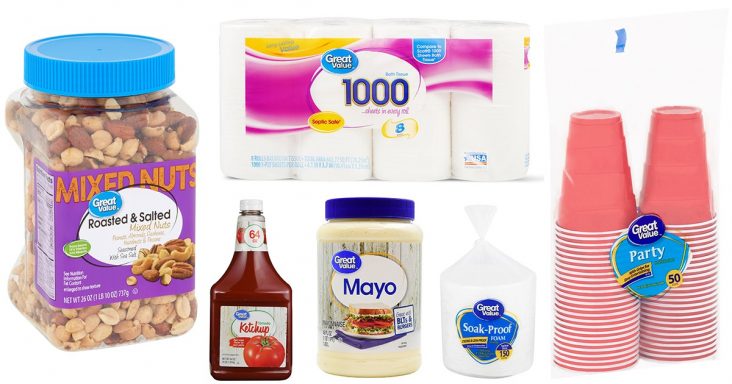Walmart asking suppliers to help company reduce plastic waste in packaging
by February 26, 2019 1:07 pm 3,016 views

Walmart set a new goal to reduce plastic waste in packaging and is asking its suppliers to join the effort. By 2025, Walmart said 100% of its private brand packaging will be recyclable, reusable or compostable.
The retailer’s new commitments were announced at its annual supplier forum on Tuesday (Feb. 26) in Bentonville. The changes are expected to impact more than 30,000 items sold in its stores and online.
“As a global retailer that has set an ambitious aspirational goal to create zero waste, we fully recognize that reducing plastic waste by increasing packaging circularity is an area where Walmart can lead,” said Laura Phillips, senior vice president for global sustainability at Walmart. “Today’s announcement marks another key milestone in our ongoing journey of working with our private brand and national brand suppliers to deliver access to high-quality, sustainable products as part of the Walmart everyday low price promise.”
Walmart said the policy is designed to get to the heart of the problem by focusing on its private brand packaging, building upon existing efforts to reduce plastic waste in Walmart U.S. and Sam’s Club operations, and encouraging national brand suppliers to set similar packaging goals. During Tuesday’s summit, executives said Walmart is working with suppliers to improve the sustainability of its private brand product packaging, with an emphasis on making it easier for customers to recycle. During the session, Walmart announced it will work with its U.S. private brand suppliers on the following commitments:
- Seek to achieve 100% recyclable, reusable or industrial compostable packing for its private brand packaging by 2025;
- Target at least 20% post-consumer recycled content in private brand packaging by 2025;
- Label 100% of food and consumable private brand packaging with the How2Recycle® label by 2022;
- Work with suppliers to eliminate the non-recyclable packaging material PVC in general merchandise packaging by 2020; and
- Reduce private brand plastic packaging when possible, optimizing the use to meet the need.
It’s not just the private brand suppliers being impacted by the initiative. Walmart executives are encouraging the company’s national brand suppliers to make similar commitments through its Project Gigaton platform.
Walmart said it has also introduced a recycling playbook designed to provide information to companies pursuing recyclable packaging and recycled content goals. The playbook will give overviews on what type of plastic packaging is more easily recycled, and it will provide information on the challenges for recycling certain packing materials. It also sets out the guidelines for Walmart’s best practices pertaining to sustainable packaging such as consumer-friendly recyclable labels.
“Plastic waste is a growing concern for Walmart customers, associates and other key stakeholders. Walmart’s aspiration is to achieve zero plastic waste by taking actions across its business and working with suppliers to use less plastic, recycle more and support innovations to improve plastic waste reduction systems,” Walmart noted in a news release.
Walmart said it already has made some efforts toward the goal in areas such as offering low-cost, high-quality alternatives for single-use plastic consumable products such as straws, cutlery and disposable tabletops. This week the retailer ditched its styrofoam cups sold in beverage stations at convenience and Neighborhood Market stores. Store workers told Talk Business & Politics this week the new cups are paper and fully recyclable. While store workers said that could hurt sales of beverages like fountain drinks, which are a traffic driver in the convenience stores, the decision to use paper was made by corporate and part of the sustainability effort.
The retailer is also recycling shrink wrap in most markets and reports 51 million pounds of plastics were recycled globally in 2017. The company has also been providing access to in-store plastic bag and film recycling for customers in stores for several years. Walmart said last year more than 800 of its private brand suppliers put the How2Recycle Label on their packaging to encourage consumers to make the effort to recycle.
Walmart suppliers have already been focusing on sustainable packaging, in part because it helps their sustainability score at Walmart and it’s also beneficial for the planet.
“We commend Walmart for working with suppliers in seeking solutions to shared problems related to plastic waste,” said Shailesh Jejurikar, president of Procter and Gamble’s fabric care division. “In setting our own plastic waste reduction goals, P&G understands that driving meaningful change in this space will require collaboration.”
The recycling industry also applauded Walmart’s announcement on Tuesday. Steve Alexander, CEO of the Association of Plastic Recyclers, said Walmart is sending a positive signal to the marketplace to encourage others to pursue similar ambitions.
Walmart’s initiative also ties into its pledge to reduce plastic waste within its operations and through its supply chain as part of the Ellen MacArthur Foundation’s New Plastics Economy Global Commitment, in accordance with the G7 Oceans Plastics Charter. As of the end of 2017, Walmart had diverted 81% of unsold products, packaging and other waste materials from landfills in the U.S.
Walmart suppliers are also taking part in Walmart’s larger Project Gigaton initiative of which recycling is just one component.
